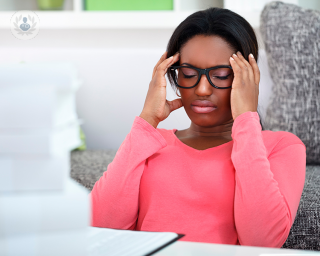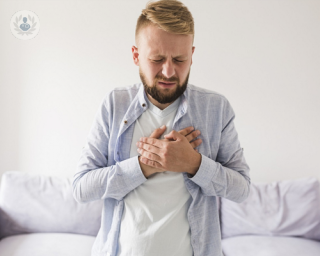Dizziness
Professor Owen Judd - Otolaryngology / ENT
Created on: 11-20-2015
Updated on: 03-28-2023
Edited by: Carlota Pano
What is dizziness?
Dizziness refers to feeling lightheaded, off-balance, faint, like you are spinning or like things are spinning around you (also called vertigo).
Dizziness is very common and it’s not something which is usually a cause for concern. It can happen, for example, when we stand up too quickly after bending down, when we’re feeling particularly hot or even after starting to take a new medicine prescription. The episode of dizziness can last from seconds to even days.
However, dizziness can also be a symptom experienced with certain conditions or an indication of an underlying problem.

What causes dizziness?
While dizziness is common, there are certain conditions which can cause you to feel dizzy for no obvious reason, of which there are many. Some of the more commonly experienced conditions include:
- Hypotension (low blood pressure): when the heart doesn't pump enough blood to the brain, this can result in dizziness.
- Hypoglycaemia (low blood sugar): the brain depends on blood sugar for its source of energy. Hypoglycaemia deprives the brain of this energy, interfering with its ability to work properly. This can cause dizziness.
- Hypertension (high blood pressure): certain medications to treat high blood pressure can cause dizziness.
- Inner ear conditions/infections, e.g Ménière’s disease: the inner ear is responsible fro the balance mechanism and sense of positioning. An infection or dysfunction in the inner area can lead to loss of balance, causing dizziness.
- Heart problems: reduced blood supply can cause insufficient blood flow to the brain, resulting in dizziness.
- Stomach flu: repeated diarrhoea and vomiting can cause dehydration, which reduces blood pressure.
- Migraine: vision and balance can be affected by migraines, causing dizziness. However, dizziness can also occur without a migraine.
- Anaemia: low levels of red blood cells reduce the amount of oxygen being supplied to organs in the body. Insufficient oxygen to the brain can cause dizziness.
- Colds and flu: they can both affect the inner area which regulates balance. Depending on how severe the flu is, dehdyration can also cause dizziness.
- Anorexia: lack of nutrients and fluids lowers blood pressure, meaning that less blood is pumped through to the brain. This can result in dizzy spells.
- Fibromyalgia: triggered points in the jaw and neck and reduced blood pressure can create a feeling of dizziness.
- Panic attacks, agoraphobia or stress: changes in breathing and blood pressure occurring during panic attacks and episodes of stress can reduce levels of oxygen and carbon dioxide in the blood, causing dizziness. Stress hormones can also affect the function of the inner area.
You may also feel dizzy during pregnancy due to rising levels of the progesterone hormone in the body. This can cause blood vessels to relax and widen, increasing blood flow to the baby. However, this also reduces the mother's own blood pressure, decreasing blood supply and oxygen to the brain. This can cause temporary dizziness.
It’s important to visit your doctor if:
- Your dizziness is severe or if it keeps coming back
- You experience symptoms such as vision loss or double vision
- You have limb numbness or weakness in the face, arms or legs
- You develop tinnitus (ringing or sounds coming from inside the ears) or hearing loss
- You have fainting episodes, headaches or nausea along with the dizziness
Elderly adults and people with past episodes of dizziness are more susceptible to experiencing dizziness.
How is dizziness treated?
Dizziness is a symptom rather than a condition, so if it is caused by an underlying condition then the condition itself must be treated.
However, if you feel dizzy and it is not a common occurrence, there are things you can do to help the dizziness go away:
- Lie down until the dizziness passes
- Make slow, careful movements
- Drink enough fluids and keep hydrated
- Avoid lying down totally flat if you experience vertigo
- Get up slowly if you do need to lie down
- Get plenty of rest
- Avoid too much salt, caffeine, tobacco and alcohol, as these could worsen the dizziness
Dizziness without an underlying cause usually gets better on its own within a couple of weeks.
Your doctor might prescribe medications (for Ménière’s disease, for anxiety or for migraines), injections, position manoeuvres or balance exercises to treat dizziness, depending on your symptoms and the cause of your condition.
Treatment is usually effective, but dizziness may recur in the future if the body and brain get less effective at preventing your symptoms.
Are vertigo and dizziness the same?
Although dizziness and vertigo are both feelings associated with balance issues, dizziness is a general term that includes a wide range of sensations, including lightheadedness, vertigo, disorientation and being off-balance. On the other hand, vertigo is a type of dizziness in which you feel as if you're spinning or that the world around you is spinning, when in fact there is no motion.
Can allergies cause dizziness?
Usually caused by airborne or food allergens, allergies can fill the Eustachian tube (a thin tube that connects the middle ear to the top part of the throat) with mucus. As a result, the tube is unable to equalize the pressure in the inner ear and maintain balance, causing dizziness.
On the other hand, dizziness caused by food allergies develop from gluten, wheat or other food product intolerances. Dizziness can appear immediately or hours later after eating the food.
What tests might be done?
Depending on your diagnosis (for example, if there is an underlying cause behind your dizziness), your doctor may order:
- A hearing test
- A blood test
- An electrocardiogram (ECG) or an echocardiogram
- A CT scan or an MRI
- Tests for the inner ear
Will dizziness caused by medications go away?
Some prescription drugs, including those that control high blood pressure and those that affect brain function or the nervous system, can commonly cause dizziness as a side effect. However, this is only temporary. Lowering the dose, switching drugs or discontinuing medication will help the dizziness to disappear.
Which specialist treats dizziness?
If dizziness is a regular occurrence then you should make an appointment with your GP, who can refer you to a specialist if necessary. An ENT specialist or a neurologist will work in conjunction with an audiologist (a specialist doctor who treats inner ear conditions) to diagnose the cause of your dizziness and determine the best treatment plan for you.
















